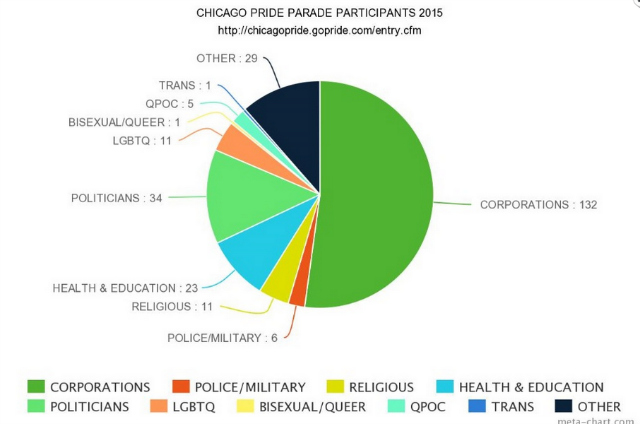Evidence Of The Corporatization Of Pride Parade, In One Pie Chart
By Rachel Cromidas in News on Jul 6, 2015 8:55PM
For better or worse, corporations love Chicago's Annual LGBTQ Pride Parade.
Evidence of this fact could be found everywhere at this year's parade, from the "I Eat Tacos" buttons passed out by Chipotle reps via a burrito-shaped float to the Google logo-emblazoned sunglasses carted around in a Google Van to the local fitness center employees whose custom T-shirts read "Less Work, More Out!"
Acceptance is very, very in these days. And while many take heart to see rainbows and glitter across their favorite brands, some LGBTQ-rights advocates are increasingly divided over whether that's unequivocally a good thing—particularly if it's coming at the expense of the radical politics that characterized the Stonewall Riots that birthed the modern pride movement.
Some parade-goers have been complaining for years that Chicago's pride festivities have gone corporate, and in the process turned into a commercialized spectacle and yet another excuse for straight people to day drink in the streets. Some LGBTQ revelers have simply chosen to stay home from the parade in response; others have turned to the growing Chicago Dyke March for a more indie alternative and still others have opted to bring their displeasure to the parade itself, as a group of #BlackLivesMatter protesters did last week, with a die-in style protest that brought the parade to a halt.
To test the theory, Illinois-resident Riley Kollaritsch crunched the numbers of parade participants, listed on the parade's website, and graphed them with a pie chart by organization type.
Kollaritsch, 27, a writer and creator of the website Project Queer, found that corporate-representation did appear to surpass LGBTQ groups at this year's parade—several times over. His graph shows there were 132 floats or parade slots held by corporations, compared to 11 LGBTQ groups, 1 bisexual group, 1 trans group and 5 groups related to queer people of color.
Pride Parade and Fest planners did not respond to requests for comment from Chicagoist Monday afternoon.
Kollaritsch told Chicagoist the graph confirmed what he already suspected, after trekking out to the parade from his home in Marseilles for several years.
"Pride has become a very heterosexual spectacle nowadays," he said. "It's not about the roots of why Pride was started, and it's not about the people who started it anymore, the [trans and queer people] who took it to the streets and made this a thing."
Though some may disagree with this perspective, arguing that mainstream acceptance and visibility beget acceptance and visibility, Kollaritsch's response is nuanced.
"It depends on the corporation. A lot of the corporations that take part happen to be quite harmful to our movement, like alcohol companies that target our communities even when something like 30 percent of our community struggles with alcoholism and drug addiction," he said. "I like to have the support of a company that genuinely cares, but if it's somebody just trying to take advantage without doing anything to give back to the community, then I don't think it's appropriate at all."
